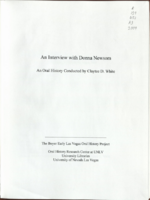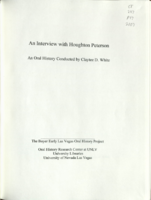Search the Special Collections and Archives Portal
Search Results

Transcript of interview with Donna Newsom by Claytee White, June 11, 2009
Date
Archival Collection
Description
Donna Newsom shares the history of her life in great detail, beginning with her childhood in Georgia and Florida. The family moved many times, following her father's work opportunities. Donna had a close relationship with her father and recalls the many daring adventures on which he took her. After graduating from high school, Donna earned a nursing degree at the Macon Hospital School of Nursing. She remembers dorm life, long hours, and the specific training nurses received in the late forties. Her career began at age 19 with a year of working at Macon Hospital as a graduate nurse, and then she made plans to leave the South. Donna's memories include moving to Houston, living in a boarding house, her first date, and working at Hermann Hospital and then Methodist Hospital. She then answered an ad to work at a Girl Scout camp in Colorado, and her roommate there became a mentor and one of her staunchest supporters. With help from her mentor, Donna went on to earn a teaching degree in Austin, Texas, met and married her husband Sam Newsom, and got involved in real estate. She relates the many experiences they had during Sam's Navy career, her teaching experience in New Orleans, and their eventual move to Las Vegas. Sam and Donna loved Las Vegas from the moment they moved here. She recalls many details of her employment at UMC, the differences in health care compared to down south, and the feeling of being safe no matter the time of day or night. Donna stays active in tutoring, the OLLI program at UNLV, and working for the Salvation Army women's auxiliary. She and Sam also get together with his golfing buddies and their wives for dinners in their various homes.
Text

Transcript of interview with Houghton Hoot Peterson by Claytee White, May 20, 2010
Date
Archival Collection
Description
Houghton Hoot Peterson played trombone in his high school band in northern Minnesota where he grew up. That same instrument would lead him to be a member of the highly regarded Air Force jazz band called Airmen of Note after enlistment. Then during a short tour at Nellis Air Force base, Hoot decided that the Las Vegas entertainment scene might have career opportunities for him. He moved to Las Vegas in 1962, an era of celebrity performers and tourists who enjoyed the crowds and nightlife. Hoot's point of view was as a musician in the band, most often a Strip relief band. But he also has tales of famous musicians and late night jam sessions. Hoot's career spanned 20 years. Eventually the Las Vegas scene for live musicians began to change. When times got tough for Hoot, he worked as a carpenter and at a music store. In this interview he discusses his fascinating past and offers advice for today's musicians.
Text

Carmon Meswarb interview, April 15, 1976: transcript
Date
Archival Collection
Description
On April 15, 1976, Judy Hammer interviewed Carmon Meswarb (b. February 9, 1932 in Cedar Falls, Iowa) about his life as a musician in Las Vegas, Nevada. Meswarb discusses how he ended up in Las Vegas, the musicians union and his time playing in a relief band. Meswarb also delves into the different entertainment acts of the 1950s and 1960s, the big-name performers, the city’s showgirls and racial segregation in entertainment. Moreover, Matson talks about the changing landscape of the city, residential areas and the changed attitude of the Strip. The interview ends with Meswarb discussing the short stint of Broadway shows on the Las Vegas Strip.
Text

Transcript of interview with Elton Garrett by Alan Gurwitz, March 1, 1981
Date
Archival Collection
Description
On March 1, 1981, Alan Gurwitz interviewed Elton Garrett (born 1902 in St. Joseph, Missouri) about his experiences in Southern Nevada and more specifically his work in Boulder City. Garrett first talks about the development of Boulder City from its inception in 1931 and how it has grown throughout nearly fifty years. He also discusses his work in journalism for the Boulder City Journal, the building of Boulder Dam, and atomic testing at the Nevada Test Site. The second part of the interview involves a discussion of the founders of Nevada Southern University, Garrett’s work on legislative committees, and his work as a schoolteacher and school principal. The interview concludes with Garrett’s thoughts on the future of Boulder City and its continued growth.
Text

Thelma Jenkins interview, October 15, 1985: transcript
Date
Archival Collection
Description
On October 15, 1985, collector Lynn Ballard interviewed Thelma Jenkins (born June 10th, 1923 in Paragonah, Utah) at her home in Henderson, Nevada. In this interview, Thelma Jenkins discusses her career in nursing as well as the differences in the various positions she’s worked. She also talks about attending various conventions and her membership in the Nevada Nurses Association.
Text

Transcript of interview with Kenneth F. Johann by Gloria Banks, March 1, 1980
Date
Archival Collection
Description
On March 1, 1980, Gloria Banks interviewed her business acquaintance, Kenneth F. Johann (born 1924 in New York City) about his work life in Las Vegas, Nevada. The two discuss the origins of Johann’s business and early land prices in Southern Nevada. Johann explains the history of his investments as well as how land development progressed in Las Vegas from the 1950s and onward.
Text

Transcript of interview with Ann K. Johnson by Wanda Cortés, March 3, 1980
Date
Archival Collection
Description
On March 3, 1980, Wanda Cortés interviewed University of Nevada, Las Vegas counselor, Ann K. Johnson (born August 28th, 1954 in Garland, Arkansas) about her life in Southern Nevada. The two discuss Johnson’s educational and occupational history. The interview concludes with a discussion on the population’s rapid growth during the seventies.
Text

Transcript of interview with Frank H. Johnson by George Baker, February 21, 1980
Date
Archival Collection
Description
On February 21, 1980, George Baker interviewed Frank H. Johnson (born July 27th , 1929 in El Paso, Texas) about his occupational history in Southern Nevada. The two discuss Johnson’s career as a journalist for the Nevada State Journal and how he transitioned into his position as a government official. Johnson then recalls problems that arose while he was chairman of the Nevada Gaming Commission. The interview concludes with Johnson speculating about the impact of industrial growth on the environment.
Text

Transcript of interview with Ray Keith by David Alexander, March 3, 1980
Date
Archival Collection
Description
On March 3, 1980, David Alexander interviewed community volunteer, Ray Keith (born October 1st, 1911 in Montgomery, Alabama) in her home in Las Vegas, Nevada about her life and memories of Southern Nevada. The two discuss how Keith first arrived in Las Vegas and the addresses that she has lived at. The interview concludes with Keith explaining how she helped to charter the “Home of the Good Shepherd” housing facilities with local Las Vegas women in the sixties.
Text

Transcript of interview with Laura Kelly by Cindy Gaylor, February 27, 1979
Date
Archival Collection
Description
On February 27, 1979, Cindy Gaylor interviewed engineering aid accountant, Laura Kelly (born December 31st, 1928 in Silverton, Colorado) in her home in Boulder City, Nevada. The two discuss Kelly’s reasons for moving, as well as her early life in Boulder City. They also discuss Nellis Air Force Base, as well as local politics. The interview concludes with a discussion of the Civilian Conservation Corps (CCC) in Southern Nevada, during the Great Depression.
Text
